
Atlas F1 News Editor
Ferrari's and Michael Schumacher's dominance of the 2002 season did not allow too much excitement. The year, however, was full of class driving, controversy and even some historic moments. Atlas F1's Pablo Elizalde looks back at each of the 17 rounds of the 2002 season, with the hindsight of how it all ended
Winner: Michael Schumacher
In Melbourne, however, Schumacher's cause was aided by a massive first corner accident between pole setter Rubens Barrichello and Ralf Schumacher in the Williams. That cleared the way for Ferrari's Schumacher to have a trouble free race that saw half the field eliminated in another dramatic first lap accident triggered by Sauber's Nick Heidfeld. With eight cars out of the race before the end of the first lap, the final top six sprung some surprises.
Juan Pablo Montoya was a distant second with the Williams, but right away there were two issues that were obvious with the British car: it was not as fast as the Ferrari, and its Michelin tyres were not a match for Ferrari's Bridgestone, the French rubber underperforming while cold. Kimi Raikkonen only needed one race to show what he was capable of with the McLaren, finishing third after a solid race.
Eddie Irvine and the Jaguar team got a lucky fourth place that did not reflect the Milton Keynes team's form who, with all sorts of problems in their R3, had struggled to avoid the final row of the grid. The day, however, belonged to Australian Mark Webber and his Minardi team, with a heroic fifth place that gave Paul Stoddart and his squad a much needed boost. "We already achieved our entire job for this year in one race," he said.
Impressive too was the performance of Toyota who, making their Formula One debut in Australia, managed to surprise everybody with their pace and scored a point thanks to Mika Salo.
Winner: Ralf Schumacher
The Williams one-two, after a first race clearly dominated by Ferrari, put both their drivers as close as they would be all season to Schumacher senior, whose third place still with the F2001 would be his worst result of the year, amazing as that sounds. The Malaysian Grand Prix would be the only race of the year where the Williams drivers would finish ahead of Schumacher, who after that only increased his lead over them. Rubens Barrichello continued to attract all of Ferrari's bad luck, his car suffering a very rare engine problem when he looked set to fight for victory against Ralf.
For McLaren the Sepang race was the confirmation that there was still a lot of work ahead if they were to at least battle for the top three positions. Both David Coulthard and Kimi Raikkonen succumbed to mechanical problems, and again the most positive fact of the weekend was the impressive pace of the young Finn, who managed to outshine his more experienced teammate.
The 'new' Renault squad were on the verge of scoring their first podium of the season thanks to a strong performance from Jenson Button, who only missed his first ever rostrum due to a problem in the final lap of the race, which allowed Schumacher to pass him.
Winner: Michael Schumacher
Come race day, however, Montoya and Schumacher clashed again, the Colombian coming off worst, as he was forced to replace his front wing and the German had to keep a cautious Ralf at bay during the final part of the race to score his second win in three races. The second accident in as many races between Schumacher and Montoya was a clear example of the Williams driver's aggressive attitude during the season, something that would cost him a lot of points in 2002.
Schumacher's win, more than anything, was a moral boost for Ferrari and a blow for their rivals as Formula One was heading for the start of the European season in the Italian squad's home. With hardly any development, the F2002 had proven at least as good as the F2001 and that was definitely bad news for Ferrari's rivals. The race was also further proof of Toyota's potential in Formula One, the Japanese squad scoring another point on a circuit they had never been before.
Winner: Michael Schumacher
"We were obviously well beaten and we've got to understand why and put it right," said Williams technical director Patrick Head after a disappointing race for his team, who after their performance in Brazil, were the favourites to repeat the win they scored last year in San Marino. As it turned out, Williams did not have the speed and their Michelin tyres were no help, and both Ralf Schumacher and especially Juan Pablo Montoya struggled during the race, which was a good example of the boredom that would mark most of the year's Grands Prix.
The only interesting point of the race was witnessing the battle between the underperforming McLarens and the much improved Renaults, which looked set to give the Woking-based outfit a good run for their money as the silver cars struggled for pace and reliability. David Coulthard's sixth place behind Jenson Button and one lap behind the winner was a clear indication that McLaren needed to raise their game and quick.
Winner: Michael Schumacher
In Barcelona, Schumacher started from pole and never relinquished the lead, finishing miles ahead of Juan Pablo Montoya, who emerged as his closest rival following Rubens Barrichello's problems. Continuing with his incredible run of bad luck, the Brazilian could not even take the start after his car refused to move off the line during the formation lap. His six points in five races, compared to Schumacher's 44, said it all about Barrichello's start of the year despite no fault of his own.
On a circuit where they had always shone if the past, McLaren were again very far from the top of the field, and David Coulthard's third place was the best they could have hoped for. Their reliability, however, was far from ideal, with Kimi Raikkonen retiring from a race for the fourth consecutive time. Further back, Sauber performed strongly to tie with Renault in the Constructors' Championship, while Heinz-Harald Frentzen gave Arrows their first point of the season. Minardi, with problems in their wings, were forced to withdraw from the race.
Winner: Michael Schumacher
Schumacher did not need it, Ferrari did not need it, and certainly Formula One did not need it. "What we saw here was a disgusting, cynical act," said Patrick Head, echoing the reaction of most racing fans around the globe. The Italian squad certainly did not think of the consequences of their acts, but the Austrian incident would haunt them for the remainder of the year and every move was analysed meticulously. Ferrari faced the FIA after the incident, but were only fined for their podium antics, as Schumacher pushed Barrichello to the top step as the German anthem was playing.
On the racing side, Ferrari proved once more they were in a class of their own, crushing the opposition, with Juan Pablo Montoya and Ralf Schumacher battling for third place, the Colombian benefitting from the entry of the Safety Car to beat his teammate. For McLaren, the race was another disappointment, with David Coulthard finishing in sixth behind an inspired Giancarlo Fisichella in the only surviving Jordan following a massive accident involving teammate Takuma Sato and Sauber's Nick Heidfeld. Luckily, both escaped serious injury.
Winner: David Coulthard
The tight streets of the principality provided just what the sport needed after the Austria debacle: a race with a non-Ferrari winner. Of course, after the first six races of the year, few were expecting McLaren would be the ones to stop Ferrari's run, but a combination of all the right elements raised the Woking-based squad to the top and Coulthard put on brilliant performance to prove that even Michael Schumacher could be beaten. The McLaren chassis, the Michelin tyres, and a great start allowed Coulthard to return to winning ways after a year. Unfortunately for their rivals, this would be the only time the F2002 would not finish in first place.
Despite the best of efforts and a sensational pole position from Juan Pablo Montoya, the race proved to be another disappointment for Williams, and Schumacher managed to increase his lead in the Championship thanks to his second place after the Colombian retired with mechanical problems. Ralf struggled to finish a very distant third, which still allowed him to move to second place in the standings, a massive 33 points behind his brother. And that with only seven races gone.
Winner: Michael Schumacher
At the Gilles Villeneuve circuit, Williams got their act together, at least in terms of speed. Juan Pablo Montoya demonstrated again his qualifying form by snatching the second of an amazing run of five consecutive pole positions. In the race, the Colombian was also on the pace and looked set to at least fight for victory against Schumacher until the end of the race, but his car let him down again. That, added to a disastrous race for teammate Ralf, left Williams with nothing to show for after one of their most promising weekends of the year.
McLaren benefitted from Williams' problems to continue with David Coulthard's momentum following his victory in Monaco. The Scot, thanks to the entry of the Safety Car and to a strong strategy, went on to finish in a second place that allowed him to move within only one point of both the Williams drivers, something unthinkable only a couple of weeks earlier. After six consecutive retirements, Kimi Raikkonen finally managed to finish a race, although the Finn could not escape problems and had to settle for a distant fourth place when he looked set for his second F1 podium.
Winner: Rubens Barrichello
The race itself did not provide any excitement at the top except in the final part of it, when the whole world was watching if Ferrari would order Barrichello to let Schumacher through again. It was not the case, and the Brazilian, who had driven flawlessly during the race, finally ended his unlucky run of results and got into a position to fight for the runner-up spot in the Championship. The Williams drivers, who has secured the first front row lockout of the year, were surprisingly slow in the race and despite their qualifying pace they were unable to even match the pace of the McLarens, let alone get close to the almighty Ferraris.
Juan Pablo Montoya was again the victim of his aggressive driving, crashing with David Coulthard while fighting for position, while Ralf Schumacher could only finish in a disappointing fourth behind Kimi Raikkonen, using a McLaren which seemed to raise its game during the races and which was obviously getting closer to the Williams, especially when it came to race pace.
Winner: Michael Schumacher
Schumacher, as usual, benefitted from the misfortunes of his rivals, and Rubens Barrichello, as usual too, was the unluckiest driver, having to take the start from the back of the grid after his car stalled. The Brazilian's charge to second place was fantastic, even if he was aided by the Bridgestone intermediate tyres, which were clearly ahead of the Michelins. "If you look at the top six the only guy on Michelins is myself," said Juan Pablo Montoya after having to settle for third despite starting from pole again. "I think the biggest issue at the moment is the tyres."
The Williams driver drove brilliant all weekend, but there was nothing he could do to stop the Ferraris when the rain began to fall. His battle with Barrichello, however, was one of the best of the year. As for Ralf Schumacher and the McLaren drivers, the race proved to be a disaster, especially for the German and David Coulthard, who endured a torrid Sunday.
Further back, the BAR team, who up to the British Grand Prix were the only ones without a point, finally managed to score. Arrows, who failed to turn a wheel on Friday, began at Silverstone their personal fight for survival, a struggle whose conclusion was still uncertain after the end of the season.
Winner: Michael Schumacher
The Finn, in a revived McLaren, put on a brilliant performance in the race to emerge in the lead thanks to a drive-through penalty to Schumacher, and kept his cool despite having the relentless German right behind him for most of the last part of the event. With five laps to go, however, Raikkonen ran over spilt oil and went wide, allowing Schumacher to take the lead and the title.
The Ferrari driver, however, had to wait until the race stewards cleared him of any wrongdoing, as McLaren had protested claiming he had overtook Raikkonen with yellow flags on track. "Kimi entered a yellow flag zone and Michael overtook before there was a green one to let him pass," said Ron Dennis after the race. "The regulation is explicit - and Kimi was overtaken under a yellow flag."
But Schumacher kept his victory to continue with his perfect record of podium finishes in 2002, while his closest rivals again failed to make the German sweat. Rubens Barrichello managed to attract all the bad luck once again, failing to even get his car moving at the start of the formation lap due to a problem with his engine. As for the Williams drivers, the race was to be just another disappointment. Despite Juan Pablo Montoya's fifth consecutive pole position, Williams was unable to match Ferrari or McLaren in the race, and the Colombian settled for a distant fourth place that allowed Schumacher and Ferrari to begin the celebrations earlier than expected.
Winner: Michael Schumacher
Schumacher started from pole at the revised Hockenheim, much shorter and spectator friendly than the previous version, and had no rivals in the race, with both Rubens Barrichello and Ralf Schumacher, who were the World Champion's main rivals over the weekend, being hit by problems that dropped them out of contention. Juan Pablo Montoya, who for the first time in six races failed to start from pole, benefitted from their problems to consolidate in the runner-up spot.
His battle with Kimi Raikkonen, however, was one of the high points of the race, although the Finn was unable to follow the Colombian once he got passed. The McLaren did not show the speed that had allowed them to fight for victory in France, and David Coulthard was the only man from the Woking squad to cross the finish line, in a very distant fifth place more than a lap down.
After a half-hearted attempt to qualify in France, the struggling Arrows team would compete in a race for the last time in Germany, leaving Heinz-Harald Frentzen and Brazilian Enrique Bernoldi without a drive for the remainder of the year.
Winner: Rubens Barrichello
The race gave another reason to believe that Ferrari would be the only team winning the remaining races of the year, with Williams and McLaren miles away from the Italian champions. At the Hungarian circuit, it was Williams' turn to outperform their British rivals, with Ralf Schumacher starring for the Grove-based squad. The German was the only man capable of getting within one second of the Ferraris in qualifying, outqualifying an out-of-form Juan Pablo Montoya by nearly a whole second. Certainly no mean feat. Schumacher was rewarded with third place, while the Colombian tried too hard to stop Kimi Raikkonen and again had nothing to show for at the end of the weekend.
The Finn McLaren driver, who completed a gutsy move to overtake Montoya - in what was one of the very few passes in a very boring race - managed to recover well from a dismal qualifying session to finish in fourth ahead of teammate David Coulthard. Despite the points, the race proved to be a disappointment for the Woking-based outfit, who were expecting to fight to victory on track with similar conditions to Monaco.
Winner: Michael Schumacher
Not even the usually exciting Belgian race could change the monotony to which Formula One fans had been accustomed to in most of the races of 2002, and Schumacher's lead was never challenged, not even by Hungary winner Rubens Barrichello, who could do nothing to match the pace of his teammate at the daunting Belgian circuit. Despite failing to shine in comparison with Schumacher, Barrichello still managed to consolidate in second place in the Championship, as the Williams drivers were unable to catch Ferrari all weekend long despite a track that was supposed to benefit them.
Juan Pablo Montoya made up for a poor qualifying showing by finishing in third place, while Ralf Schumacher was unable to escape problems during the race and finished nearly a minute behind his brother. However, it was Kimi Raikkonen and his McLaren who looked like Michael Schumacher's main rival most of the weekend. The Finn made the World Champion sweat to beat him to pole position, but he was once more the innocent victim of his McLaren's poor reliability.
The Belgian Grand Prix also marked a short but significant revival for the Jaguar team who, with the much revised R3 chassis, bode well at Spa, with Eddie Irvine finally returning to the points on merit following the lucky strike of the Australian Grand Prix.
Winner: Rubens Barrichello
For the first time in several races, however, the Italian squad's dominance was challenged, if only briefly, by the Williams duo. Benefitting from the power of their BMW and the low downforce nature of the track, both Ralf Schumacher and Juan Pablo Montoya were in contention for victory in the initial part of the race.
In the end, however, and after his seventh pole of the year, the Colombian was unable to match the race pace of the Ferraris. Their reliability neither, as both him and Ralf went on to retire with mechanical problems, the German's engine giving up when leading. If Williams took a more risky approach to get close to Ferrari, they showed that they still had a lot of work left in order to get close to the World Champions' reliability.
The misfortunes of the Williams duo were, surprisingly, Jaguar's benefit, as the Ford-owned team came good and allowed Eddie Irvine to become the only driver from a team other than Ferrari, Williams or McLaren to finish on the podium in 2002. Italy's Jarno Trulli also put on a brilliant performance to take his Renault from the back of the grid to fourth place, consolidating the French squad's position in the Championship.
Winner: Rubens Barrichello
With the memories of the Austrian Grand Prix incident still in everybody's minds, Schumacher's error and the way he tried to play it down claiming he was aiming for a dead heat caused uproar in the paddock, overshadowing another flawless racing performance from the German and his team. "How can you have a dead heat? In modern technology when one thousandth of a second is possible, dead heats are gone out with Roy Rogers, The Lone Ranger, the War of the Roses and all that stuff," said Eddie Jordan after the race, reflecting the thoughts of many.
For Williams, like in Italy, the event was bitterly disappointing and, after a close fight with McLaren in qualifying, their race was done after only two laps, when Juan Pablo Montoya and Ralf Schumacher clashed and put each other out of contention. David Coulthard, who was McLaren's main man during most of the weekend, finished in a relatively strong third that continued to prove the progress made by the Mercedes-powered team and gave some hope to those expecting more than one team fighting for wins in 2003.
Winner: Michael Schumacher
Apart from Ferrari, the end of the season was a relief for everybody else. Williams and McLaren were again very far from their rivals and the final race of the year was yet another disappointment for both teams. McLaren were the strongest of the two in Japan and, benefitting from the retirement of teammate David Coulthard, Kimi Raikkonen completed the podium ahead of an obscure Juan Pablo Montoya. The end result was just another clear sign that there is a long winter ahead of both teams in order to catch up to Ferrari.
Despite his umpteenth victory, the star of the day was not Michael Schumacher but Takuma Sato, who became an instant hero after scoring his first ever Formula One points with a fifth place that meant a cash boost for his Jordan team, who leapfrogged both BAR and Jaguar in the standings. The result also boosted Sato's chances of staying in Grand Prix racing next season after struggling to live up to the expectations set by Eddie Jordan at the start of the year. The roar of the Japanese crowd resembled the season opening Australian Grand Prix, where the Aussies cheered local hero Mark Webber. In between those two races lots of cheers and jeers were heard, but most of them were aimed at Ferrari.
Round 1: Australia Minardi and Webber Upstage Schumacher's Win
Pole Position: Rubens Barrichello (1:25.843)
Fastest Lap: Kimi Raikkonen (1:28.541)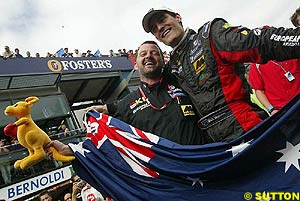 Right from the start the signs of a Ferrari-dominated season were there for everybody to see. Despite playing down their chances of even scoring a podium finish, Michael Schumacher kept his momentum from the past season going and, using an updated version of the F2001 car, the German had hardly any opposition to kick off the year with another victory. The decision to use the 'old' car was not as risky as many initially thought, as the car proved the class of the field both in terms of speed and reliability. The fact that Ferrari were still using the car to test at the end of the year speaks volumes about its speed.
Right from the start the signs of a Ferrari-dominated season were there for everybody to see. Despite playing down their chances of even scoring a podium finish, Michael Schumacher kept his momentum from the past season going and, using an updated version of the F2001 car, the German had hardly any opposition to kick off the year with another victory. The decision to use the 'old' car was not as risky as many initially thought, as the car proved the class of the field both in terms of speed and reliability. The fact that Ferrari were still using the car to test at the end of the year speaks volumes about its speed.
Drivers' Standings Constructors' Standings
1. M.Schumacher 10 1. Ferrari 10
2. Montoya 6 2. Williams-BMW 6
3. Raikkonen 4 3. McLaren-Mercedes 4
4. Irvine 3 4. Jaguar-Cosworth 3
5. Webber 2 5. Minardi-Asiatech 2
6. Salo 1 6. Toyota 1
Round 2: Malaysia Ralf Stars in Williams Illusion
Pole Position: Michael Schumacher (1:35.266)
Fastest Lap: Juan Pablo Montoya (1:38.049)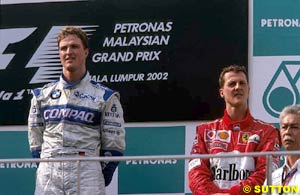 There was no demerit to the first Williams one-two finish of the season, but in hindsight it's evident that at the Malaysian Grand Prix the Grove-based squad benefitted immensely from a first corner clash between Juan Pablo Montoya and Michael Schumacher, an incident which took the German out of contention. As it turned out, it would be the only in-race problem that the Ferrari driver would suffer. Benefitting from the clash of his two rivals, and from the elevated temperatures that helped his Michelin tyres, Ralf Schumacher scored his fourth career win with a flawless drive.
There was no demerit to the first Williams one-two finish of the season, but in hindsight it's evident that at the Malaysian Grand Prix the Grove-based squad benefitted immensely from a first corner clash between Juan Pablo Montoya and Michael Schumacher, an incident which took the German out of contention. As it turned out, it would be the only in-race problem that the Ferrari driver would suffer. Benefitting from the clash of his two rivals, and from the elevated temperatures that helped his Michelin tyres, Ralf Schumacher scored his fourth career win with a flawless drive.
Drivers' Standings Constructors' Standings
1. M.Schumacher 14 1. Williams-BMW 22
2. Montoya 12 2. Ferrari 14
3. R.Schumacher 10 3. McLaren-Mercedes 4
4. Raikkonen 4 4. Renault 3
5. Button 3 = Jaguar-Cosworth 3
= Irvine 3 = Sauber-Petronas 3
Round 3: Brazil The F2002 is Born a Winner
Pole Position: Juan Pablo Montoya (1:13.114)
Fastest Lap: Juan Pablo Montoya (1:16.079)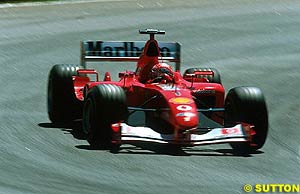 Ferrari only needed the Brazilian Grand Prix to confirm that their decision to delay the introduction of the F2002 was the right one. The new machine, only in the hands of Michael Schumacher, came, saw and conquered, despite concerns about its reliability due to lack of testing. The new car, however, not only proved very fast, but also bulletproof, and it was Rubens Barrichello in the old F2001 who was, once more, affected by problems. Ferrari faced the difficult task of having to work with two different chassis during the weekend, and with the Williams of Juan Pablo Montoya looking like the car to beat in qualifying, the prospects were looking better for the British squad.
Ferrari only needed the Brazilian Grand Prix to confirm that their decision to delay the introduction of the F2002 was the right one. The new machine, only in the hands of Michael Schumacher, came, saw and conquered, despite concerns about its reliability due to lack of testing. The new car, however, not only proved very fast, but also bulletproof, and it was Rubens Barrichello in the old F2001 who was, once more, affected by problems. Ferrari faced the difficult task of having to work with two different chassis during the weekend, and with the Williams of Juan Pablo Montoya looking like the car to beat in qualifying, the prospects were looking better for the British squad.
Drivers' Standings Constructors' Standings
1. M.Schumacher 24 1. Williams-BMW 30
2. R.Schumacher 16 2. Ferrari 24
3. Montoya 14 3. McLaren-Mercedes 8
4. Button 6 4. Renault 6
5. Raikkonen 4 = Jaguar-Cosworth 3
= Coulthard 4 = Sauber-Petronas 3
Round 4: San Marino Relentless Ferrari
Pole Position: Michael Schumacher (1:21.091)
Fastest Lap: Rubens Barrichello (1:24.170)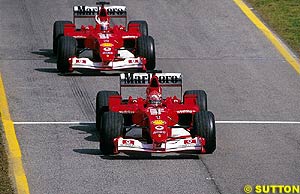 The San Marino Grand Prix was probably the first clear sign of what the 2002 season would turn out to be, with Michael Schumacher thoroughly dominating the race from start to finish and the weekend from Friday to Sunday as the F2002 began to show what it was capable of. If in Brazil it had looked as if Williams were going to be a serious challenger to Ferrari's dominance, the Imola race vanished that notion as soon as Schumacher and Rubens Barrichello, finally using the F2002, disappeared into the distance after having secured a front row lockout in front of the delighted Italian fans.
The San Marino Grand Prix was probably the first clear sign of what the 2002 season would turn out to be, with Michael Schumacher thoroughly dominating the race from start to finish and the weekend from Friday to Sunday as the F2002 began to show what it was capable of. If in Brazil it had looked as if Williams were going to be a serious challenger to Ferrari's dominance, the Imola race vanished that notion as soon as Schumacher and Rubens Barrichello, finally using the F2002, disappeared into the distance after having secured a front row lockout in front of the delighted Italian fans.
Drivers' Standings Constructors' Standings
1. M.Schumacher 34 1. Ferrari 40
2. R.Schumacher 20 2. Williams-BMW 37
3. Montoya 17 3. McLaren-Mercedes 9
4. Button 8 4. Renault 8
5. Barrichello 6 5. Jaguar-Cosworth 3
6. Coulthard 5 = Sauber-Petronas 3
Round 5: Spain King Schumacher of Spain
Pole Position: Michael Schumacher (1:16.364)
Fastest Lap: Michael Schumacher (1:20.355)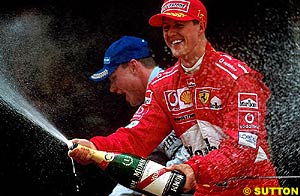 If the Imola race had already shown worrying signs for all of Ferrari's rivals, the Spanish Grand Prix was just another nail in the coffin of a season which was already starting to have an owner, and that was Michael Schumacher. If the German had been dominant two weeks earlier in Italy, his demonstration of superiority in Spain served to prove that the F2002 had more potential than the most pessimist of Ferrari's rivals had feared. "Forget the Drivers' Championship. There's just no chance," said BMW boss Gerhard Berger after the race. "But you never know what happens. I think we have an outside chance in the Constructors' Championship. But not a real chance."
If the Imola race had already shown worrying signs for all of Ferrari's rivals, the Spanish Grand Prix was just another nail in the coffin of a season which was already starting to have an owner, and that was Michael Schumacher. If the German had been dominant two weeks earlier in Italy, his demonstration of superiority in Spain served to prove that the F2002 had more potential than the most pessimist of Ferrari's rivals had feared. "Forget the Drivers' Championship. There's just no chance," said BMW boss Gerhard Berger after the race. "But you never know what happens. I think we have an outside chance in the Constructors' Championship. But not a real chance."
Drivers' Standings Constructors' Standings
1. M.Schumacher 44 1. Ferrari 50
2. Montoya 23 2. Williams-BMW 43
3. R.Schumacher 20 3. McLaren-Mercedes 13
4. Coulthard 9 4. Sauber-Petronas 8
5. Button 8 = Renault 8
6. Barrichello 6 6. Jaguar-Cosworth 3
Round 6: Austria The A1-Wring
Pole Position: Rubens Barrichello (1:08.082)
Fastest Lap: Michael Schumacher (1:09.298)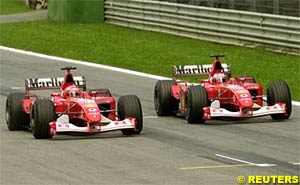 The 2002 season could have solely been remembered as a year of total dominance from Ferrari if the Austrian Grand Prix had not taken place. But, unfortunately for them and for Formula One, the race did take place and the memory of the 'A1-Wring' would stick into everybody's mind until the end of the season, and surely further beyond that. It's not very often that Michael Schumacher is outshone by a teammate, but in Austria Rubens Barrichello was the man to beat. He started from pole and led the race, until Ferrari ordered him to make way for Michael Schumacher, the German overtaking the Brazilian within meters of the finish line. For the first time in recent history, the crowd jeered the drivers.
The 2002 season could have solely been remembered as a year of total dominance from Ferrari if the Austrian Grand Prix had not taken place. But, unfortunately for them and for Formula One, the race did take place and the memory of the 'A1-Wring' would stick into everybody's mind until the end of the season, and surely further beyond that. It's not very often that Michael Schumacher is outshone by a teammate, but in Austria Rubens Barrichello was the man to beat. He started from pole and led the race, until Ferrari ordered him to make way for Michael Schumacher, the German overtaking the Brazilian within meters of the finish line. For the first time in recent history, the crowd jeered the drivers.
Drivers' Standings Constructors' Standings
1. M.Schumacher 54 1. Ferrari 66
2. Montoya 27 2. Williams-BMW 50
3. R.Schumacher 23 3. McLaren-Mercedes 14
4. Barrichello 12 4. Renault 8
5. Coulthard 10 =. Sauber-Petronas 8
6. Button 8 6. Jaguar-Cosworth 3
Round 7: Monaco Coulthard's Magic Trick
Pole Position: Juan Pablo Montoya (1:16.676)
Fastest Lap: Rubens Barrichello (1:18.023)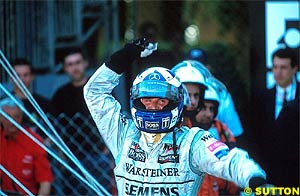 With the images of the Austrian Grand Prix still fresh in everybody's mind, the race in Monaco attracted more attention than any other event in 2002. And watching David Coulthard stopping Ferrari's seemingly unstoppable run of wins certainly did no harm to Formula One. "It restored Formula One's credibility in many respects because it was such an exciting race all the way through," said Eddie Jordan after the race. "Even the battle for sixth place, the battle for fifth place, for fourth... all in all it was a testament to Formula One and showed what it can be."
With the images of the Austrian Grand Prix still fresh in everybody's mind, the race in Monaco attracted more attention than any other event in 2002. And watching David Coulthard stopping Ferrari's seemingly unstoppable run of wins certainly did no harm to Formula One. "It restored Formula One's credibility in many respects because it was such an exciting race all the way through," said Eddie Jordan after the race. "Even the battle for sixth place, the battle for fifth place, for fourth... all in all it was a testament to Formula One and showed what it can be."
Drivers' Standings Constructors' Standings
1. M.Schumacher 60 1. Ferrari 72
2. R.Schumacher 27 2. Williams-BMW 54
= Montoya 27 3. McLaren-Mercedes 24
4. Coulthard 20 4. Renault 11
5. Barrichello 12 5. Sauber-Petronas 8
6. Button 8 6. Jordan-Honda 4
Round 8: Canada Ferrari's 150th
Pole Position: Juan Pablo Montoya (1:12.836)
Fastest Lap: Juan Pablo Montoya (1:15.960)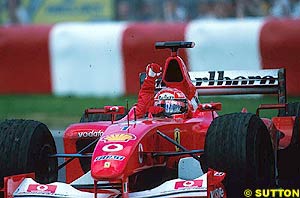 Michael Schumacher's sixth win in eight races - and also Ferrari's 150th F1 victory - brought everyone back to reality following the surprise of the Monaco Grand Prix. 70 points out of a possible 80 was a good reflection of how the Ferrari driver had turned 2002 into a cakewalk with still more than half the season left to run. Despite his dominance in the Championship, however, the Canadian Grand Prix was not as easy for Schumacher as his other five previous victories, and the German was, to some extent, made to sweat for a brief moment.
Michael Schumacher's sixth win in eight races - and also Ferrari's 150th F1 victory - brought everyone back to reality following the surprise of the Monaco Grand Prix. 70 points out of a possible 80 was a good reflection of how the Ferrari driver had turned 2002 into a cakewalk with still more than half the season left to run. Despite his dominance in the Championship, however, the Canadian Grand Prix was not as easy for Schumacher as his other five previous victories, and the German was, to some extent, made to sweat for a brief moment.
Drivers' Standings Constructors' Standings
1. M.Schumacher 70 1. Ferrari 86
2. R.Schumacher 27 2. Williams-BMW 54
= Montoya 27 3. McLaren-Mercedes 33
4. Coulthard 26 4. Renault 12
5. Barrichello 16 5. Sauber-Petronas 8
6. Button 8 6. Jordan-Honda 6
Round 9: Europe Barrichello Breaks the Duck
Pole Position: Juan Pablo Montoya (1:29.906)
Fastest Lap: Michael Schumacher(1:32.226)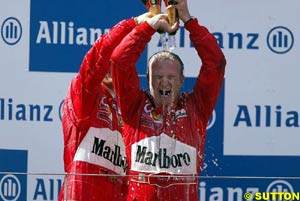 The European Grand Prix at the Nurburgring was the first of the examples that showed that Ferrari felt under pressure from the crowd, the media and the FIA following the incident in Austria. The race also proved that the Italian World Champions had learned a valuable lesson from the A1-Ring. The race in Germany again saw the use of team orders to allow Rubens Barrichello to score a due second F1 win, but this time Ferrari did it in a politically correct manner, and the uproar of the Austrian Grand Prix was not repeated. Perhaps it was because Barrichello was owed a victory, but most likely it was because this time the orders were not as evident as in Austria, with Michael Schumacher only needing to slow down not to interfere in his teammate's way.
The European Grand Prix at the Nurburgring was the first of the examples that showed that Ferrari felt under pressure from the crowd, the media and the FIA following the incident in Austria. The race also proved that the Italian World Champions had learned a valuable lesson from the A1-Ring. The race in Germany again saw the use of team orders to allow Rubens Barrichello to score a due second F1 win, but this time Ferrari did it in a politically correct manner, and the uproar of the Austrian Grand Prix was not repeated. Perhaps it was because Barrichello was owed a victory, but most likely it was because this time the orders were not as evident as in Austria, with Michael Schumacher only needing to slow down not to interfere in his teammate's way.
Drivers' Standings Constructors' Standings
1. M.Schumacher 76 1. Ferrari 102
2. R.Schumacher 30 2. Williams-BMW 57
3. Montoya 27 3. McLaren-Mercedes 37
4. Coulthard 26 4. Renault 14
= Barrichello 26 5. Sauber-Petronas 9
6. Raikkonen 11 6. Jordan-Honda 6
Round 10: Britain Rain or Shine, it's Schumacher Again
Pole Position: Juan Pablo Montoya (1:18.998)
Fastest Lap: Rubens Barrichello (1:23.083)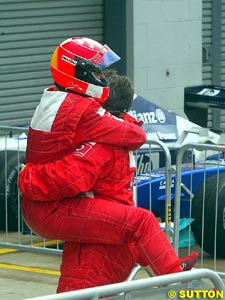 A bit of rain is all it took for Formula One to change its face and provide probably the most exciting race of the whole 2002 season. And that despite Michael Schumacher clinching his seventh win in ten races, and Ferrari scoring their fourth one-two finish in yet another dominant display. At Silverstone, the German did the driving and the team, especially Ross Brawn, made all the right calls when the rain began to fall, causing chaos among several teams. Not only the Ferraris were the fastest, but they were also among the few who kept their cool in the changing conditions and made the right decisions.
A bit of rain is all it took for Formula One to change its face and provide probably the most exciting race of the whole 2002 season. And that despite Michael Schumacher clinching his seventh win in ten races, and Ferrari scoring their fourth one-two finish in yet another dominant display. At Silverstone, the German did the driving and the team, especially Ross Brawn, made all the right calls when the rain began to fall, causing chaos among several teams. Not only the Ferraris were the fastest, but they were also among the few who kept their cool in the changing conditions and made the right decisions.
Drivers' Standings Constructors' Standings
1. M.Schumacher 86 1. Ferrari 118
2. Barrichello 32 2. Williams-BMW 61
3. Montoya 31 3. McLaren-Mercedes 37
4. R.Schumacher 30 4. Renault 14
5. Coulthard 26 5. Sauber-Petronas 10
6. Raikkonen 11 6. Jordan-Honda 6
Round 11: France Five-Star Schumacher
Pole Position: Juan Pablo Montoya (1:11.985)
Fastest Lap: David Coulthard (1:15.045)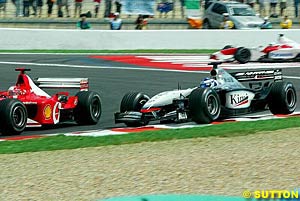 It was just a matter of time before Michael Schumacher clinched his record-equalling fifth title, and to further prove that nothing was going to go wrong on track for the German in 2002, he seized his first opportunity and scored yet another victory that culminated the most dominant year by a single driver in Formula One history. With a massive 96 points in 11 races, Schumacher clinched his fifth crown in record-time, and again he had lady luck on his side, as the race belonged to Kimi Raikkonen.
It was just a matter of time before Michael Schumacher clinched his record-equalling fifth title, and to further prove that nothing was going to go wrong on track for the German in 2002, he seized his first opportunity and scored yet another victory that culminated the most dominant year by a single driver in Formula One history. With a massive 96 points in 11 races, Schumacher clinched his fifth crown in record-time, and again he had lady luck on his side, as the race belonged to Kimi Raikkonen.
Drivers' Standings Constructors' Standings
1. M.Schumacher 96 WC 1. Ferrari 128
2. Montoya 34 2. Williams-BMW 66
3. Barrichello 32 3. McLaren-Mercedes 47
= R.Schumacher 32 4. Renault 15
5. Coulthard 30 5. Sauber-Petronas 10
6. Raikkonen 17 6. Jordan-Honda 6
Round 12: Germany New Track, Same Story
Pole Position: Michael Schumacher(1:14.389)
Fastest Lap: Michael Schumacher (1:16.462)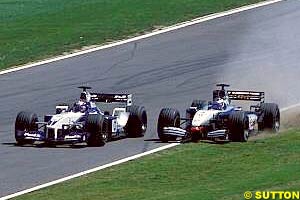 If anyone thought that Michael Schumacher would relax after clinching his fifth title only one week earlier, they had to think again after the Hockenheim race, where the Ferrari driver showed his level of motivation has no ends with another dominant victory in front of his home crowd, his first with the Italian squad at the German Grand Prix. "He doesn't need any motivation because he likes what he is doing and that is motivation enough," said Ross Brawn of Schumacher after the race. "He is a race driver with all of his heart and you can see it on the podium and feel it wherever he goes and I hope it stays like this for the next 20 years."
If anyone thought that Michael Schumacher would relax after clinching his fifth title only one week earlier, they had to think again after the Hockenheim race, where the Ferrari driver showed his level of motivation has no ends with another dominant victory in front of his home crowd, his first with the Italian squad at the German Grand Prix. "He doesn't need any motivation because he likes what he is doing and that is motivation enough," said Ross Brawn of Schumacher after the race. "He is a race driver with all of his heart and you can see it on the podium and feel it wherever he goes and I hope it stays like this for the next 20 years."
Drivers' Standings Constructors' Standings
1. M.Schumacher 106 WC 1. Ferrari 141
2. Montoya 40 2. Williams-BMW 76
3. R.Schumacher 36 3. McLaren-Mercedes 49
4. Barrichello 35 4. Renault 15
5. Coulthard 32 5. Sauber-Petronas 11
6. Raikkonen 17 6. Jordan-Honda 6
Round 13: Hungary Barrichello's Cakewalk
Pole Position: Rubens Barrichello (1:13.333)
Fastest Lap: Michael Schumacher (1:16.207)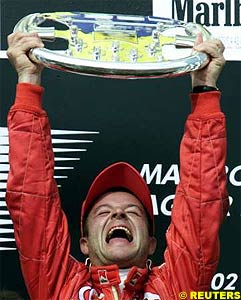 The Hungaroring provided Ferrari with another perfect chance to show their dominance of Formula One, and in that respect the Italian team did not disappoint, scoring yet another win that helped them clinch their fourth consecutive Constructors' Championship. The race, however, was as dull and unexciting as it can get, with the two red cars of Rubens Barrichello and Michael Schumacher disappearing into the distance. This time, though, it was the Brazilian who emerged on top of his teammate, who did not seem to be trying too hard during the weekend. Barrichello, however, was inspired and, after an impressive pole position, he put on a flawless performance that helped him regain the runner-up spot in the Championship.
The Hungaroring provided Ferrari with another perfect chance to show their dominance of Formula One, and in that respect the Italian team did not disappoint, scoring yet another win that helped them clinch their fourth consecutive Constructors' Championship. The race, however, was as dull and unexciting as it can get, with the two red cars of Rubens Barrichello and Michael Schumacher disappearing into the distance. This time, though, it was the Brazilian who emerged on top of his teammate, who did not seem to be trying too hard during the weekend. Barrichello, however, was inspired and, after an impressive pole position, he put on a flawless performance that helped him regain the runner-up spot in the Championship.
Drivers' Standings Constructors' Standings
1. M.Schumacher 112 WC 1. Ferrari 157 CC
2. Barrichello 45 2. Williams-BMW 80
3. R.Schumacher 40 3. McLaren-Mercedes 54
= Montoya 40 4. Renault 15
5. Coulthard 34 5. Sauber-Petronas 11
6. Raikkonen 20 6. Jordan-Honda 7
Round 14: Belgium Perfect 10 for Schumacher
Pole Position: Michael Schumacher (1:43.726)
Fastest Lap: Michael Schumacher (1:47.176)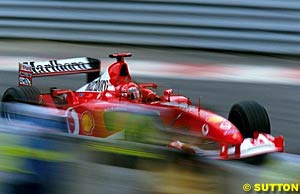 On his favourite track, with a perfect record of reliability, and with a car that was miles ahead of the rest of the field Michael Schumacher crushed the opposition at the Belgian Grand Prix to become the first driver in Formula One history to score 10 wins in a single season. Having somewhat relaxed in Hungary, the Ferrari driver was back to his usual self at Spa, dominating the race from start to finish in another display of mastery that had started with his first ever pole in Belgium.
On his favourite track, with a perfect record of reliability, and with a car that was miles ahead of the rest of the field Michael Schumacher crushed the opposition at the Belgian Grand Prix to become the first driver in Formula One history to score 10 wins in a single season. Having somewhat relaxed in Hungary, the Ferrari driver was back to his usual self at Spa, dominating the race from start to finish in another display of mastery that had started with his first ever pole in Belgium.
Drivers' Standings Constructors' Standings
1. M.Schumacher 122 WC 1. Ferrari 173 CC
2. Barrichello 51 2. Williams-BMW 86
3. Montoya 44 3. McLaren-Mercedes 57
4. R.Schumacher 42 4. Renault 15
5. Coulthard 37 5. Sauber-Petronas 11
6. Raikkonen 20 6. Jordan-Honda 7
Round 15: Italy Ferrari's Monza Party
Pole Position: Juan Pablo Montoya (1:20.264)
Fastest Lap: Rubens Barrichello (1:23.657)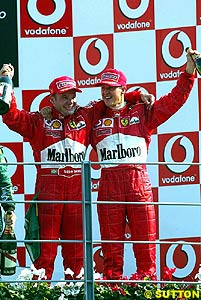 Anything but another one-two at their home Grand Prix would have been a disappointment for Ferrari, but there was no heartbreak for the tifosi, who saw the red cars crossing the line together to kick off the celebrations of a year of unprecedented success for the Italian squad. This time, however, it was Rubens Barrichello who finished ahead of Michael Schumacher as Ferrari concentrated all their efforts in securing that the Brazilian would finish in second place in the standings. With his third win of the season, Barrichello all but secured that, giving Ferrari a theoretical green to allow both him and Schumacher to race each other, something that Formula One needed and that every racing fan was looking forward to.
Anything but another one-two at their home Grand Prix would have been a disappointment for Ferrari, but there was no heartbreak for the tifosi, who saw the red cars crossing the line together to kick off the celebrations of a year of unprecedented success for the Italian squad. This time, however, it was Rubens Barrichello who finished ahead of Michael Schumacher as Ferrari concentrated all their efforts in securing that the Brazilian would finish in second place in the standings. With his third win of the season, Barrichello all but secured that, giving Ferrari a theoretical green to allow both him and Schumacher to race each other, something that Formula One needed and that every racing fan was looking forward to.
Drivers' Standings Constructors' Standings
1. M.Schumacher 128 WC 1. Ferrari 189 CC
2. Barrichello 61 2. Williams-BMW 86
3. Montoya 44 3. McLaren-Mercedes 57
4. R.Schumacher 42 4. Renault 20
5. Coulthard 37 5. Sauber-Petronas 11
6. Raikkonen 20 6. Jaguar-Cosworth 8
Round 16: United States The Closest Ever Fiasco
Pole Position: Michael Schumacher(1:10.790)
Fastest Lap: Rubens Barrichello (1:12.738)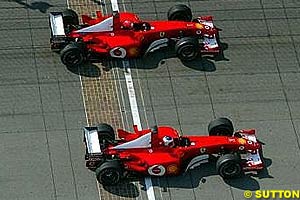 The United States Grand Prix epitomised the 2002 season for Ferrari, with yet another demonstration of power that was overshadowed by another PR blunder that could have been avoided and that did not do any good to Formula One in one of its most difficult years. Having taken a break from winning in Italy, Michael Schumacher was back on form at Indianapolis, taking pole and dominating the race from start to finish. Or at least until the final meters, when he decided to back off to cross the line with Rubens Barrichello right beside him. The move backfired, and it was the Brazilian who crossed in front of his teammate.
The United States Grand Prix epitomised the 2002 season for Ferrari, with yet another demonstration of power that was overshadowed by another PR blunder that could have been avoided and that did not do any good to Formula One in one of its most difficult years. Having taken a break from winning in Italy, Michael Schumacher was back on form at Indianapolis, taking pole and dominating the race from start to finish. Or at least until the final meters, when he decided to back off to cross the line with Rubens Barrichello right beside him. The move backfired, and it was the Brazilian who crossed in front of his teammate.
Drivers' Standings Constructors' Standings
1. M.Schumacher 134 WC 1. Ferrari 205 CC
2. Barrichello 71 2. Williams-BMW 89
3. Montoya 47 3. McLaren-Mercedes 61
4. R.Schumacher 42 4. Renault 22
5. Coulthard 41 5. Sauber-Petronas 11
6. Raikkonen 20 6. Jaguar-Cosworth 8
Round 17: Japan Schumacher Wins on Sato's Day
Pole Position: Michael Schumacher(1:31.317)
Fastest Lap: Michael Schumacher (1:36.125)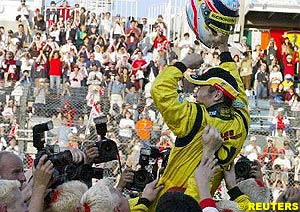 Unthinkable as it may have sounded before the start of the year, the Japanese Grand Prix saw Michael Schumacher completing a perfect season with 17 podium finishes, and only six of them below the top step. At Suzuka, and as expected, the German scored his 11th win of the season to elevate his points tally to a massive 144 out of the maximum possible 170. This time there was no controversy and, having dominated the race from the start, Schumacher crossed the finish line clearly ahead of teammate Rubens Barrichello, who completed Ferrari's ninth one-two of 2002 to take the Italian squad to 221 points, the same tally that all the other teams combined.
Unthinkable as it may have sounded before the start of the year, the Japanese Grand Prix saw Michael Schumacher completing a perfect season with 17 podium finishes, and only six of them below the top step. At Suzuka, and as expected, the German scored his 11th win of the season to elevate his points tally to a massive 144 out of the maximum possible 170. This time there was no controversy and, having dominated the race from the start, Schumacher crossed the finish line clearly ahead of teammate Rubens Barrichello, who completed Ferrari's ninth one-two of 2002 to take the Italian squad to 221 points, the same tally that all the other teams combined.
Drivers' Standings Constructors' Standings
1. M.Schumacher 144 WC 1. Ferrari 221 CC
2. Barrichello 77 2. Williams-BMW 92
3. Montoya 50 3. McLaren-Mercedes 65
4. R.Schumacher 42 4. Renault 23
5. Coulthard 41 5. Sauber-Petronas 11
6. Raikkonen 24 6. Jordan-Honda 9
7. Button 14 7. Jaguar-Cosworth 8
8. Trulli 9 8. BAR-Honda 7
9. Irvine 8 9. Minardi-Asiatech 2 (1x5)
10. Heidfeld 7 (1x4) 10. Toyota 2 (2x6, 2x7)
11. Fisichella 7 (3x5) 11. Arrows-Cosworth 2 (2x6, 1x10)
12. Villeneuve 4 (1x4)
13. Massa 4 (1x5)
14. Panis 3
15. Sato 2 (1x5, 1x8, 1x9)
16. Webber 2 (1x5, 1x8, 4x11)
17. Salo 2 (2x6, 1x7)
18. Frentzen 2 (2x6, 1x11)
19. McNish 0 (1x7, 1x8)
20. Yoong 0 (1x7, 1x10)
21. De la Rosa 0 (2x8)
22. Bernoldi 0 (1x10)
23. Davidson 0 (2xR)
Please Contact Us for permission to republish this or any other material from Atlas F1.
|
Volume 8, Issue 43
Atlas F1 Exclusive
Max Mosley on the F1 Crisis
Is the Sky Falling?
Jo Ramirez: a Racing Man
2002 Season Review
The 2002 Race-by-Race Review
The 2002 Drivers Review
The 2002 Teams Review
The 2002 Technical Review
The Atlas F1 Top Ten
The 2002 Trivia Quiz
Columns
Bookworm Critique
Elsewhere in Racing
The Grapevine
> Homepage |
